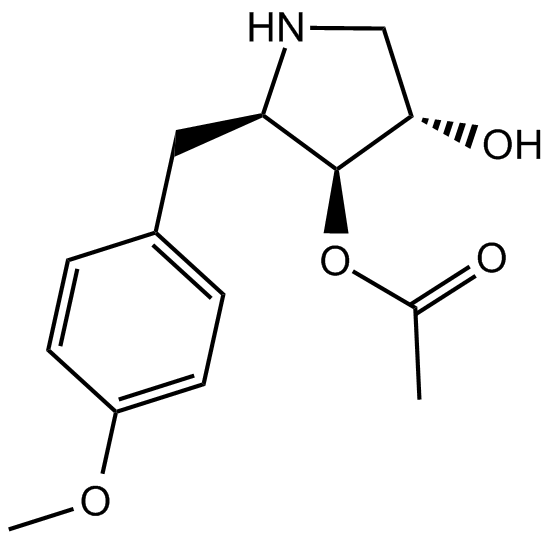Anisomycin (Synonyms: Flagecidin, NSC 76712, Wuningmeisu C) |
| Catalog No.GC11559 |
JNK agonist, potent and specific
Products are for research use only. Not for human use. We do not sell to patients.

Cas No.: 22862-76-6
Sample solution is provided at 25 µL, 10mM.
Anisomycin is a specific agonist of JNK with a concentration of 25 ng/ml [1].
JNK is short for c-Jun N-terminal kinase which reported as a proapoptotic kinase and plays an important role in many cellular events, such as cell cycle, proliferation, apoptosis and cell stress. It is also reported that JNK plays a pivotal role in the cell apoptosis induced by UV and activated JNK pathway could enhance TNF-α mediated apoptosis thus often regarded as a potent target in clinic [2] [3].
Anisomycin is a potent JNK agonist. When tested with hormone refractory cell line DU 145(highly resist to Fas mediated apoptosis), 250 ng/ml anisomysin treatment induced DU145 cells apoptosis together with Fas (200 ng/ml) via activating JNK [4]. In HL-60 cells, treatment of anisomysin activated JNK pathway activity which further induced cell apoptosis [5]. When tested with primary murine embryonic fibroblasts, anisomycin treatment stimulated cell apoptosis via activating JNK expression [6].
References:
[1]. Jiang, J., et al., Spermassociated antigen 9 promotes astrocytoma cell invasion through the upregulation of podocalyxin. Mol Med Rep, 2014. 10(1): p. 417-22.
[2]. Lin, A., Activation of the JNK signaling pathway: breaking the brake on apoptosis. Bioessays, 2003. 25(1): p. 17-24.
[3]. Liu, J. and A. Lin, Role of JNK activation in apoptosis: a double-edged sword. Cell Res, 2005. 15(1): p. 36-42.
[4]. Curtin, J.F. and T.G. Cotter, Anisomycin activates JNK and sensitises DU 145 prostate carcinoma cells to Fas mediated apoptosis. Br J Cancer, 2002. 87(10): p. 1188-94.
[5]. Stadheim, T.A. and G.L. Kucera, c-Jun N-terminal kinase/stress-activated protein kinase (JNK/SAPK) is required for mitoxantrone- and anisomycin-induced apoptosis in HL-60 cells. Leuk Res, 2002. 26(1): p. 55-65.
[6]. Tournier, C., et al., Requirement of JNK for stress-induced activation of the cytochrome c-mediated death pathway. Science, 2000. 288(5467): p. 870-4.
Average Rating: 5 (Based on Reviews and 36 reference(s) in Google Scholar.)
GLPBIO products are for RESEARCH USE ONLY. Please make sure your review or question is research based.
Required fields are marked with *




